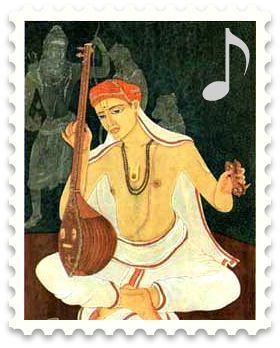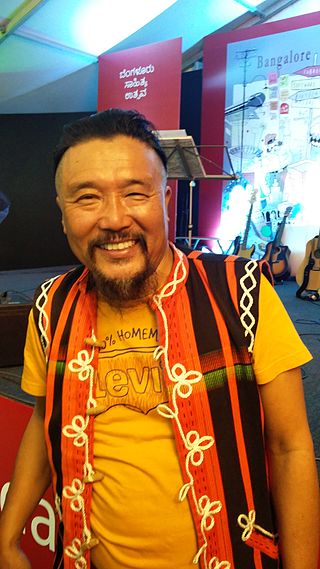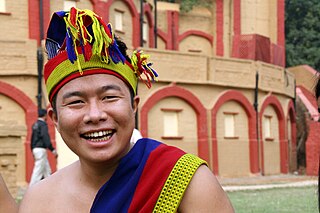Hakama are a type of traditional Japanese clothing. Originally stemming from kù, the trousers worn by members of the Chinese imperial court in the Sui and Tang dynasties, this style was adopted by the Japanese in the form of hakama in the 6th century. Hakama are tied at the waist and fall approximately to the ankles. They are worn over a kimono specially adapted for wearing hakama, known as a hakamashita.

Nagaland is a landlocked state in the north-eastern region of India. It is bordered by the Indian states of Arunachal Pradesh to the north, Assam to the west, Manipur to the south, and the Naga Self-Administered Zone of the Sagaing Region of Myanmar (Burma) to the east. Its capital city is Kohima and its largest city is the twin Chümoukedima–Dimapur. The state has an area of 16,579 square kilometres (6,401 sq mi) with a population of 1,980,602 as per the 2011 Census of India, making it one of the smallest states of India.

Nagaland is inhabited by 15 major tribes along with other sub-tribes. Each tribe is distinct in character in terms of customs, language and dress. It is a land of folklore passed down the generations through word of mouth. Here, music is an integral part of life.

Nagas are various ethnic groups native to northeastern India and northwestern Myanmar. The groups have similar cultures and traditions, and form the majority of population in the Indian state of Nagaland and Naga Self-Administered Zone of Myanmar (Burma); with significant populations in Manipur, Arunachal Pradesh and Assam in India; Sagaing Region and Kachin State in Myanmar.
The Angamis are a major Naga ethnic group native to the Northeast Indian state of Nagaland.
The Aos are a major Naga ethnic group native to Mokokchung District of Nagaland in Northeast India. Their main territory is from Tsüla (Dikhu) Valley in the east to Tsürang (Disai) Valley in the west in Mokokchung District.

Kohima District is a district of the Indian state of Nagaland. It is the home of the Angami Nagas. As of 2011, it is the most populous district of Nagaland, with a population of 267,988, 45% of which is urban. The district is home to 13.55% of Nagaland's entire population. The administrative headquarters of the district is located at Kohima, the capital city of Nagaland. Kohima District is also the seventh-largest district in Nagaland with an area of 1,207 square kilometres (466 sq mi).

The Konyaks are a major Naga ethnic group native to the Northeast Indian state of Nagaland. They inhabit the Mon District, which is also known as The Land of the Anghs. The Anghs/Wangs are their traditional chiefs whom they hold in high esteem. Facial tattoos were earned for taking an enemy's head.

Nagasari is a traditional Indonesia steamed cake, originating from Javanese cuisine, made of rice flour, coconut milk and sugar, filled with a slice of banana and wrapped in banana leaves.
Naga cuisine is the traditional foods of the Naga people in the northeastern region of India and northwestern region of Myanmar. Each ethnic group of the Nagas prepares its own unique style of cuisines. It most notably features rice, meats and leaf vegetables. Meat prepared by the Nagas are often smoked, dried or fermented.

The Roneat Ek or Roneat Aek is a xylophone used in the Khmer classical music of Cambodia. It is built in the shape of a curved, rectangular shaped boat. It has twenty-one thick bamboo or hard wood bars that are suspended from strings attached to the two walls. They are cut into pieces of the same width, but of different lengths and thickness. Originally these instruments were highly decorated with inlay and carvings on the sides of the sound box. Now they are simpler. The Roneat is played in the Pinpeat ensemble. In that ensemble, sits on the right of the Roneat Thung, a lower-pitched xylophone. The roneat ek is the analogous equivalent to the Thai xylophone called ranat ek, and the Burmese bamboo xylophone called "pattala".
Naga shawls are traditional shawls with a distinctive pattern made by various Naga ethnic groups from Nagaland and its neighbouring areas in Northeast India. Naga shawls embody specific traditional connotations that symbolize status, identity, and achievement. Beyond being a piece of cloth, Naga shawls convey rich traditional narratives. These textiles serve as vehicles of communication, perpetually transmitted from one generation to the next, fostering cultural continuity within Naga society. Particularly noteworthy is their significance within the Naga community, which is devoid of script or written historical records.
The Phoms are a Naga ethnic group native to the Northeast Indian state of Nagaland. Their traditional territory lies between the territories of Konyak in the north-east, the Ao in the west and the Chang in the south. Phoms celebrate several festivals in a year of which Monyiü is the greatest. It is celebrated from April 1 to 6 every year. Other traditional festivals include Moha, Bongvüm and Paangmo. They primarily inhabit the Longleng District.

Rewben Mashangva, also Guru Rewben Mashangva, is a folk musician and singer from Manipur, India. He is known for reviving musical tradition of the Tangkhul Naga of Manipur, and use of traditional musical instruments in his songs. Influenced by musicians such as Bob Dylan and Bob Marley, Rewben Mashangva has created many Naga tribal folk songs based on blues and ballad rhythms. He is known by different names including, 'Bob Dylan of the Nagas' and 'King of Naga folk blues', plus 'Father of Naga folk blues'. He received the National Tribal Award 2011-12, for his contribution to the development of tribal music from the Ministry of Tribal Affairs, Government of India. The Government of India honoured him in 2021, with the award of Padma Shri, the fourth highest Indian civilian award for his rich contribution to art.
Jadonang Malangmei (1905-1931), popularly known as Haipou Jadonang, was a Naga spiritual leader and political activist from Manipur, British India. He established the Heraka religious movement, which was based on the ancestral Naga religion, and declared himself to be the "messiah king" of the Nagas. His movement was widespread in the Zeliangrong territory before the conversion to Christianity. He also espoused the cause of an independent Naga kingdom, which brought him in conflict with the colonial British rulers of India. He was hanged by the British in 1931, and succeeded by his cousin Rani Gaidinliu.

The Anāl is a Naga tribe native to Manipur state in North-East India and part of Myanmar. They are listed as a Scheduled Tribe, in accordance with The Scheduled Castes and Scheduled Tribes Orders (Amendment) Act, 1976 Indian Constitution. The Anāl tribe is one of the 'sixty six Naga tribes' of the Naga ancestral homeland. The members of this tribe are found both in India and Myanmar. In India, they are situated in the States of Manipur and Nagaland but mostly concentrated in the former. In the State of Manipur, the Anāl Naga population concentrated in Chandel and a few Anāl villages are located in its neighbouring districts, Churachandpur district has about three villages and Thoubal district has one or two.
Reptilian humanoids, or anthropomorphic reptiles, are fictional creatures that appear in folklore, fiction, and conspiracy theories.

Klub Sepakbola Tiga Naga is an Indonesian football club based in Pekanbaru, Riau. Their homebase is Tumpal Sinaga Stadium.
Aki Kiti is a semi-contact combat sport involving kicking and blocking with soles. It is a traditional sport originating from the Sümi Naga people of Nagaland, India. Played inside a circular ring on ground, it is normally played between two fighters. The objective is to make the opponent fall on knee or touch ground with hands or step outside of playing zone.
Kene or Naga wrestling is a folk wrestling style and traditional sport of the Nagas. It is closely related to Ssireum, the traditional national sport of Korea. The objective of the sport is to bring any part of the opponent's body above the knee to the ground.